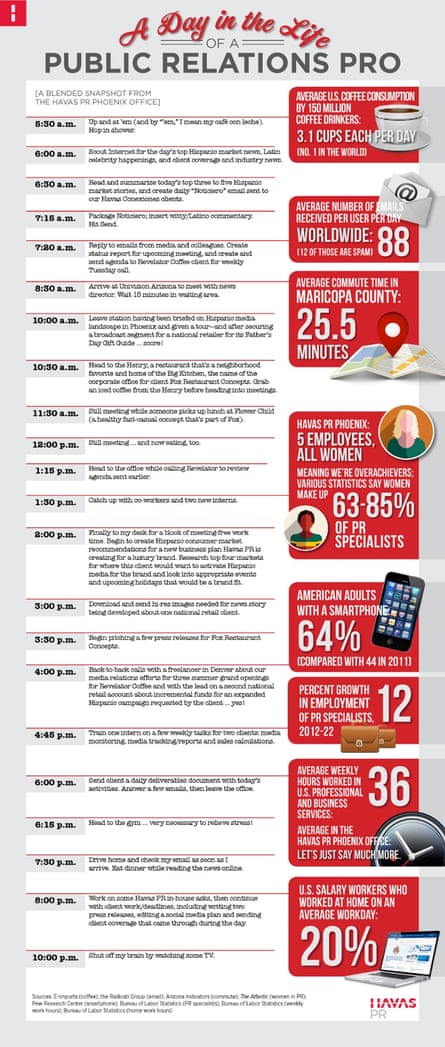Back when I was working as a games journalist in London, I was quite fond of PR people. They were bombastic, jokey, honest and, most importantly, self-loathing.
If you said “your game’s a bit shit, mate”, they’d laugh and at times agree. If you said “don’t bloody call me” they’d mostly apologise and never do it again. There was a quasi-camaraderie: both sides accepted our job’s end game was to get words printed in a magazine.
But when I moved to America and started working in PR, I found a depressing world made of passive-aggressive emails, office back-chat and an oppositional, saccharine reporter-PR relationship.
I was actively encouraged to spam and pester writers. I was told this is what a PR professional did. When I said “this seems a bit off”, my co-workers would chide me, saying “things were different over here” and that “reporters didn’t mind”.
When my first reporter told me to go fuck myself on a cold call, I cottoned on.
I eventually cracked and quit that agency, but not before spending too much time listening to PR people describe themselves in grandiose terms bordering on black magic.
You’d find those descriptors in public speeches, in meetings, in pitches. The language used was like an extremely shit epic poem – think Paradise Lost, but about a bunch of assholes in an office.
Eventually, it occurred to me to investigate – and the answer was that the PR industry simply wrote its own history. Despite PR professionals regularly telling us they’re storytellers, the only tale they’ve woven is an elaborate farce of empty self-importance that borders on the religious.
Preach to the converted
Now, I’m sure there are bad PR people in the UK, but America’s PR corps at times borders on the wilful insanity of a church.
The Public Relations Society of America (PRSA) costs $255 a year, with a $65 initiation fee. To join a local chapter, it costs anywhere from $30 (Anchorage, Alaska) to $252 (Little Rock, Arkansas) a year.
There are cheaper tiers for younger PR people, especially former members of the delightful Public Relations Student Society of America (PRSSA) – which is like the army’s ROTC program except the only thing you’ll end up killing is your spirit.
The one PRSA event I went to was effectively a luncheon. They were very nice, someone gave a speech about PR for awareness of the California water crisis, I gave a talk, someone at the back was glowering at me for saying you shouldn’t call reporters, I was thanked and promptly left. The room (as pleasant as the people were) felt dismal. People had a look of knowing they had to be there, but with no reason other than it being “it’s important to be part of the PR world”.
Spread the good word everywhere you go – and get ’em young
This attitude translates to the online world as well.
PR’s online presence is built for two things: to defend the “goodness” of PR and to sustain its importance in its own congregation. And just like any great church, they get ’em young.
Good career advice is hard to find within the titanic PR “Twitter chats” (a hashtag people use as one large, very awkward chatroom) such as #NPPRSA, a chat for New Public Relations Professionals.
There, they all learn about how being positive is good, that someone had an event, that you can overthink having a mentor, and of course, how to make the most of being a new PR professional (which is actually a blogpost selling you on a $200 webinar and your local PRSA events).
#PRStudChat is even worse: it is organizing timed chats which ask thrilling questions such as “how prepared are you for PR?” – netting great answers like “we need to do more social media” – or “do you like visual learning?”
Some PR Twitter accounts (such as the aptly named Plank Center) effectively just repeat the same advice again and again, including faux-theoretical pieces such as 7 Skills That Prove PR Is For You, which describes skills useful in almost every job.
Like people? PR’s for you. Team player? PR’s for you. Are you a “strategic thinker”, which is borderline meaningless but rolls off the tongue nicely? PR’s for you.
Praise the blogs
Many PR blogs also exist to hammer home their own reasons for existing in the first place.
One blog wins most vile lede of all time by calling PR pros “wizards at cyberstalking”; another associates Tom Brady’s court victory with PR people by quoting their tweets; and this blog defines a Millennial as someone with nine windows open on their computer.
Plenty of random PR blogs like to underline how stressful the job is, but nothing is more telling of PR’s importance syndrome than this tragic, positively worded infographic of a PR person’s 5:30am-10pm workday.

It’s just “so darn stressful”, because “you’re working toward a creative vision that changes as it develops”.
That, and “[PR people] touch everything. And [are] Type A control freaks.” Talk about a hard-knock life.
Never say a bad word about the gospel
If there’s one lesson to learn in all this, it’s that everyone in PR is there to promote PR – a weird circle of praise that just never, ever ends.
Even when someone says PR is bad, they add “Uh, why not have us get a certification?” It exists, it’s called the Accreditation in Public Relations, and it’s sold by the PRSA.
So, Praise Public Relations: it is, after all, #PREthics month.
PR is a a good industry, one that never would celebrate cold calling reporters despite being told it’s bad all the time.
It’s super ethical.
There are so many reasons why you should work in PR. Join us.
Public Relations Is The Best.

Comments (…)
Sign in or create your Guardian account to join the discussion